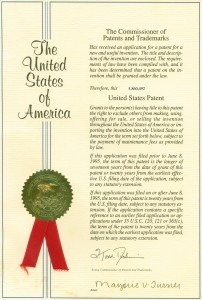To Patent or Not To Patent?

Not a week goes by that I don’t have to sign an NDA, and then hear these words: “Do you think I should patent my formula?” And my answer is…that depends.
Patents are an amazing option for people that have created something truly , truly unique. However, there really are not that many products in the health and beauty that are unique on market.
, truly unique. However, there really are not that many products in the health and beauty that are unique on market.
Maybe the packaging is unique, maybe the delivery method is unique but the nuts & bolts of the product (lotions, soaps, hair, cosmetics) generally are not that unique.
Let’s run down some scenarios:
Scenario #1: You are buying a manufacturer’s base and adding a few drops or blends of essential oil to the formula.
A. Don’t bother patenting this. First, it’s not your formula or your base to patent. Second, while the finished product is amazing and has lots of awesome benefits, it’s still not your formula as you don’t own the base. You own the percentages of oils or fragrances that you are adding to the product but not the entire formula.
Scenario #2: You have a product or lotion that is well known and have shelf space in major retailers such as Whole Foods, CVS, etc.
A. I still wouldn’t patent this formula. I would however, trademark all the marketing material, slogans, logo’s and buy the formula from the manufacturer along with an agreement that they won’t sell or market this to anyone else.
Owning the formula and mixing instructions will be more valuable to you than owning the patent.
Scenario #3: You created something from scratch. You know the mixing instructions, the ingredients percentages all of it like the back of your hand, should you patent it?
A. My answer is it depends on how big you are growing with it. It may just be as important to patent the marketing pieces than the actual formula. The chances of someone else knocking off your brand exactly are very slim. Usually, if someone sees a product that they want to “knock off” they will. However, what they can’t re-create is Y-O-U, your brand and your story.
Overall, my general advice is not to patent a product. I always advise trademarking the marketing, slogans, logo’s etc.
There are always exceptions to the rule, if you have a unique raw material combination, or process that changes the raw materials, if you have clinical studies on a raw material or finished product then spend the money to patent the product.
To patent or not to patent shouldn’t be stumbling block on your journey in product development. My suggestion is to work with an attorney that specializes in patents and trademarks if you are still unsure of what to do.
Have you been wondering how to create your own product line? Maybe you are confused on where to start? Let me help. Register for this free workshop.

Again Melody is spot on. My general rule is unless you are developing a new material or a new technology a patent is of little use. Trademarking however is a possibility. Honestly we are all pulling from the same pool of materials and just about any Chemist can reproduce your product by working backwards. But as you build the identity (ingredients, marketing, labels, bottles, overall identity) you are building a unique property. At this point you may want to consider trademarking. A great example of this is Woolite. Just about any Chemist can recreate Woolite. However, much like Kleenex or Xerox, Woolite has a strong market identity. As such there has yet to be a profitable one-off.
Always insist upon an NDA when revealing product specific information. Not only can it protect you, it is also an effective litmus test in qualifying a manufacturer.